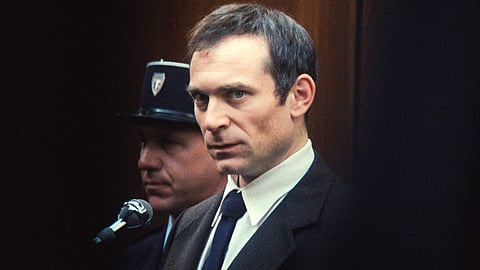

Talking of an embarrassment of riches, in the year of Anatomy of a Fall, yet another French courtroom drama, Cedric Kahn’s The Goldman Case, makes for cinema at its most compelling. Having premiered in Directors’ Fortnight in Cannes last year, the film went on to become a major box office success in France and it recently played at the Red Lorry Film Festival in Mumbai.
Set in 1975 France, Kahn’s film is inspired by the trials of real-life Leftist intellectual-activist-gentleman-criminal Pierre Goldman. He is sentenced to life imprisonment in the first trial for four armed robberies, one of which was in a Paris pharmacy in 1969 that resulted in the killing of two pharmacists. However, Goldman denied having a hand in it and pleaded not guilty to the murder charges while confessing to committing three earlier thefts. It’s this second trial that’s the focus of Kahn’s riveting film that derives much of the power from the taut original screenplay, written by him and Nathalie Hertzberg, along with Arieh Worthalter’s simmering performance in the lead role.
Despite taking occasional liberties with the truth, Kahn and Hertzberg are scrupulous in documenting the famous second trial in all its minutest of details. Simultaneously, they mine the inherent drama in the situation and create a fascinating portrait of a flawed hero who is himself facing partisanship and injustice; or so he claims. As he puts it in the court: “I’m innocent because I’m innocent. Not even you can change the fact.” Such a provocative approach opens his case to the risk of a death sentence.
The almost two-hour, dialogue-heavy film has a taut narrative that never loses your attention. It keeps the audience engaged, making them wait with bated breath for every new turn of the case and Goldman’s mercurial ways. Admirably, in the light of the fact that much of the action is confined to the set of the court, the screen is akin to a proscenium and the film is like a stage play. In fact, in the lack of much physical action, it’s the words, exchanges, conversations, and arguments that lend to the dynamism, energy, urgency and tension to the proceedings.
Kahn has a fantastic ensemble perfectly in tune with each other. But the soul of the film is Worthalter who nails Goldman with his steely gaze, unbending ways, intense presence, biting wit, fierce, righteous anger, and resoluteness in the pursuit of justice. The complexity of the character is irresistible—the Polish-Jewish refugee identity, Communist roots and subversive ways that go as far as arguing the case himself much against the wishes of his defense lawyers; and casting aspersions on the French police, its purportedly racist and intimidatory ways. No wonder they say that one man’s militant is another’s revolutionary. Goldman’s case split France wide open; he had his loyal supporters as well as furious detractors among the populace back then. His electric, alluring moral ambiguity continues to leave the house divided, this time among the viewers of the film. Love him, hate him, but you can’t ignore him. Worthalter ensures you won’t take your eyes off him.
His is a fascinating, magnetic interpretation of a radical rebel in a society that is itself in a state of tumult and turmoil, its fabric torn between conservatism and liberalism, insularity, and diversity, bigotry, and tolerance, and, of course, the usual, proverbial right and left. The ideas underlying The Goldman Case make it true to its time and equally contemporary and universal. One for the ages, it offers a lot of food for thought—political, ideological, and social—while never losing sight of being a solid, punchy entertainer.